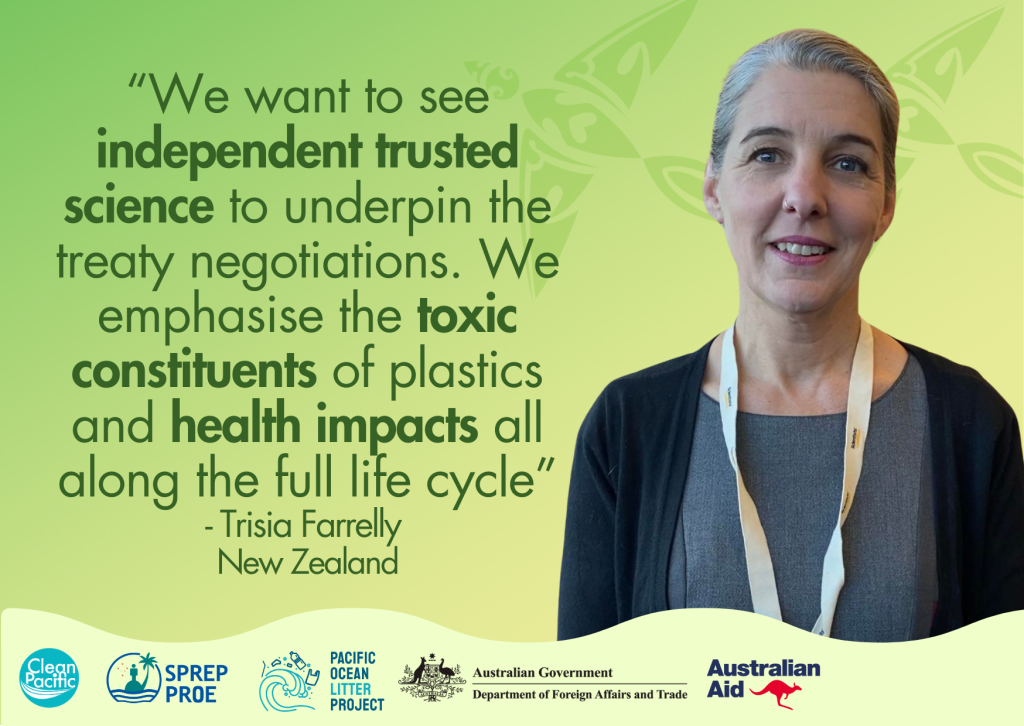
28 April 2024, Ottawa Canada - Scientific evidence shows that plastics and associated chemicals, including some bio-based plastics, are destabilising the biosphere, harming the natural environment and living organisms including humans, and threatening the right to a clean, healthy, and sustainable environment.
As 14 Pacific countries and delegates from around the world advance discussions to streamline the text of a legally binding instrument to address plastic pollution, the Scientists’ Coalition for an Effective Plastic Treaty has urged member states to prioritise independent scientific evidence and to take a full life cycle approach in their negotiations.
“The Scientist Coalition really wants to see independent trusted science to underpin and ground the treaty negotiations here at INC-4. We want to make sure that member states have everything they need in terms of the science around all aspects of plastic pollution, the full life cycle from the extraction all the way through to removal and remediation,” said Professor Trisia Farrelly, the Coordinator of the Coalition. “We want to make sure that everybody has all the information they need and that they know where this information comes from.”
On Sunday, at the ongoing fourth session of the Intergovernmental Negotiating Committee (INC-4), members of the Scientists’ Coalition met members of the Pacific Small Island Developing States (PSIDS) group to talk about the health impacts of plastic pollution, and offer clarification on some of the issues that have surfaced during the negotiations.
The Coalition and PSIDS discussed issues like nano and micro plastics, chemicals in plastics particularly hazardous chemicals, endocrine chemicals found in plastics and the significant impact of both chemical and material properties of plastics on food systems, food safety and food sovereignty.
“The greatest challenge in this INC process is the fact that plastic is so transboundary, and it comes in many forms,” said Professor Farrelly. “It’s not just pieces of plastics, it’s not just your plastic single use cup but it is all the things that are inside that cup you cannot see with the human eye. It is what has happened before you receive that cup, right from the extraction of the feedstock that are used to make that cup, whether it be through bio or fossil-fuel based feedstock.”

According to the Scientists’ Coalition for an Effective Plastic Treaty, plastics are a source of pollution throughout their entire life cycle, with releases to air, land, and water at all stages globally. At polymer production and manufacturing stages, chemicals and micro and nanoplastics (MNPs) are released, including monomers, polymers, additives, pellets, flakes, powders, and fragments.
Spills and releases also occur during transportation. During commercial, industrial and consumer use phases, plastics are intentionally and unintentionally released, e.g., via use of fishing gear, agricultural plastics; and releases and emissions of chemicals and MNPs from plastics in the environment.
Further releases occur during waste management including recycling. In addition, plastics weather constantly, making these smaller particles and persistent chemicals in permanent movement, a difficult target to assess with small particles shed and chemicals liberated. Plastics pollution impacts environmental and human health via daily exposure, multiple exposure routes (e.g., contaminated food or inhalation of particles), and cumulate impacts.
“It is all the chemicals that are involved, we know there are 16,000 chemicals now involved in plastics and many of those are known substances of concern,” said Professor Farrelly.
At INC-4, what is the message from the Scientists’ Coalition for an Effective Plastic Treaty to negotiators?
“At INC-4, we have the World Health Organisation, we have Health Care Without Harm and we stand beside them and really want to emphasise the toxic constituents of plastics, NMPs, and their health impacts all along the full lifecycle. That’s something we’d like to see highlighted and of course human rights go alongside those human impacts as well, not just environmental but also human, social and economic impacts as well.”
The Scientists’ Coalition for an Effective Plastics Treaty is a network of independent scientific and technical experts seeking to contribute to the treaty process with summaries and interpretations of scientific knowledge to decision makers and the public involved in the negotiations towards a global plastics treaty.
The Coalition was formed in 2022, following the decision of the United Nations Environment Assembly (UNEA) to start the negotiations towards a treaty to end plastic pollution.
The meeting between the Scientists Coalition and PSIDS took place during the group’s daily coordination meeting on Sunday, as negotiations approach a critical juncture in Ottawa, Canada with two days to go.
The fourth Intergovernmental Negotiating Committee to develop an international legally binding instrument on plastic pollution, including in the marine environment is taking place in Ottawa, Canada, from 23-29 April 2024.
The Pacific Islands are represented by the Cook Islands, Federated States of Micronesia, Fiji, Kiribati, Marshall Islands, Nauru, Niue, Palau, Papua New Guinea, Samoa, Solomon Islands, Tonga, Tuvalu and Vanuatu through the support of the Government of Australia and the United Nations.
They are supported by the Secretariat of the Pacific Regional Environment Programme (SPREP), working with partners the Pacific Islands Forum Secretariat (PIFS), Office of the Pacific Ocean Commissioner (OPOC), The Pacific Community (SPC), Forum Fisheries Agency (FFA), Environmental Investigation Agency (EIA), Centre for International Environmental Law (CIEL), University of Wollongong, WWF and Massey University.
For more information visit: https://www.unep.org/inc-plastic-pollution/session-4